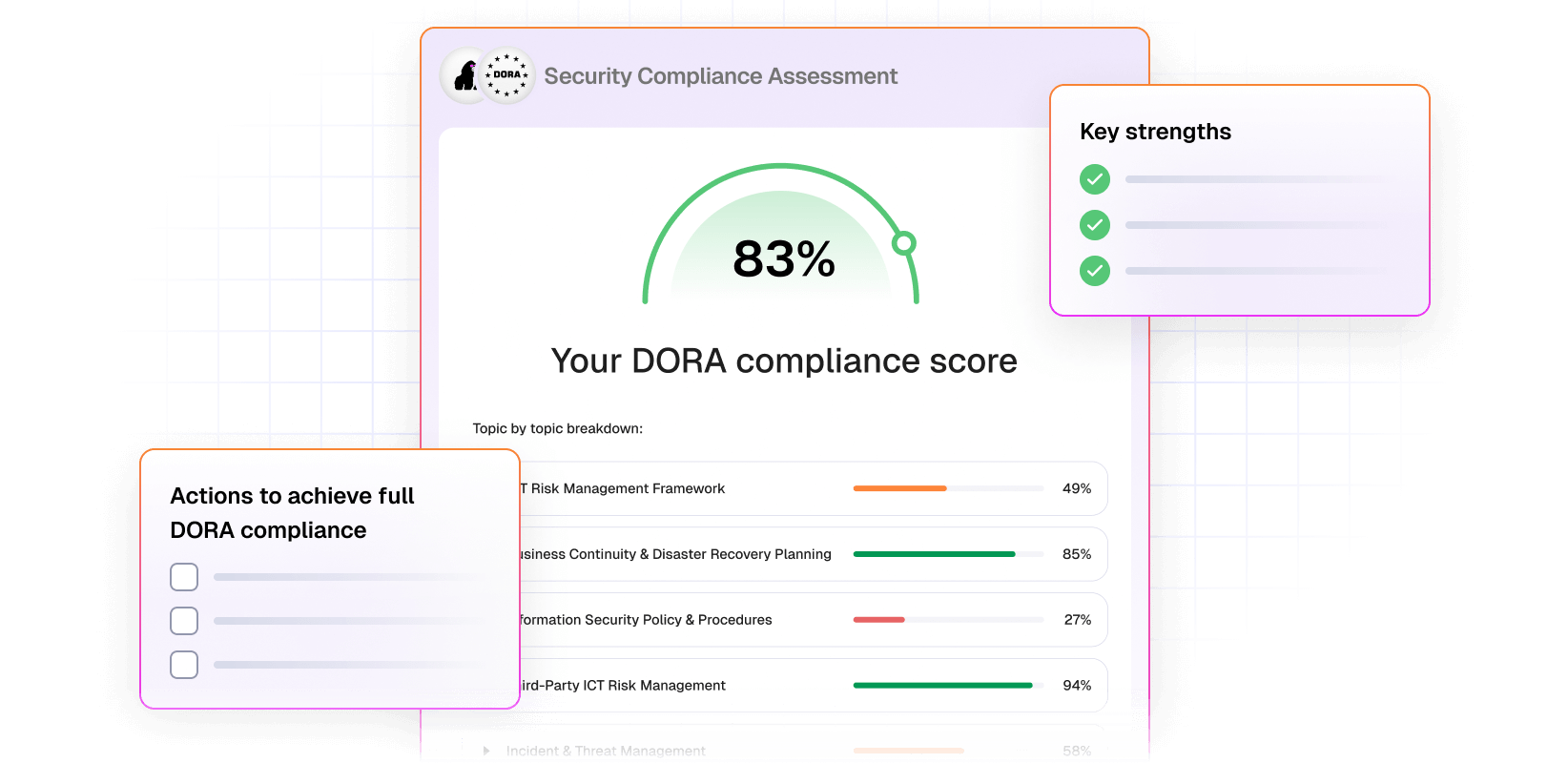Finland has long been recognized for its progressive digital infrastructure and robust cybersecurity culture. From advanced electronic identification services to a thriving fintech scene, the country has embraced technology as a cornerstone of its financial sector. With the EU’s Digital Operational Resilience Act (DORA), Finnish organizations are expected to adopt stricter, more uniform requirements around ICT risk management, incident reporting, and third-party oversight. This post discusses how Finland is implementing DORA, compares that process to other EU nations, and highlights the existing Finnish regulations that share DORA’s objectives. We’ll also provide a short list of auditing firms in Finland capable of guiding businesses through DORA’s demands.

Assess your DORA readiness for free!
Evaluate your organization’s compliance gaps and find areas for improvement—no prior DORA knowledge needed.
Why DORA matters in Finland
DORA targets financial entities such as banks, insurers, and investment firms, but its influence doesn’t stop there. Any company offering essential IT services to these institutions must also align with the regulation’s requirements. Given Finland’s deep-rooted digital maturity—exemplified by widespread online banking, mobile payments, and automation—DORA’s standardized rules are particularly relevant. By compelling organizations to formalize incident response strategies and vendor management processes, DORA aims to minimize operational disruptions and safeguard the trust of Finnish consumers, who have come to expect secure digital services.
PRO TIP
Even if you already have mature digital infrastructure, treat DORA as a tool for visibility and governance refinement. Use it to identify blind spots in incident response workflows or vendor dependencies that may have gone unchallenged until now.
Comparing Finland’s approach to other EU countries
Like all EU member states, Finland must align domestic frameworks with DORA’s provisions. However, each country’s unique supervisory structure and legal context influence how these rules are applied in practice. In Finland, the Financial Supervisory Authority (Finanssivalvonta or FIN-FSA) oversees banks, insurance companies, and other financial institutions. In parallel, the Finnish Transport and Communications Agency (Traficom) addresses broader cybersecurity concerns.
This relatively centralized model can streamline the adoption of EU directives like DORA. Nonetheless, Finnish regulators often engage in public consultations with industry stakeholders, ensuring that local implementation considers practical details and operational realities. Companies operating in multiple EU jurisdictions should remain mindful that interpretations of incident reporting timelines or classification thresholds may vary slightly from country to country.
PRO TIP
Monitor public consultations by FIN-FSA and Traficom to anticipate local guidance updates. This gives your team an early-mover advantage in adjusting risk management protocols before DORA enforcement ramps up across the EU.
Finland’s existing regulations aligning with DORA
Even before DORA, Finland had enacted measures designed to fortify cybersecurity and promote operational continuity. Below is a brief summary of notable regulations and how they relate to DORA’s requirements:
| Finnish regulation or measure | Focus area | How it aligns with DORA |
| Act on Strong Electronic Identification and Trust Services (617/2009) | Governs secure electronic identification and trust service provision | Complements DORA’s emphasis on safeguarding key digital infrastructure and ensuring reliable authentication methods |
| FIN-FSA guidelines on outsourcing and risk management | Sets standards for financial institutions regarding vendor oversight and operational risk | Mirrors DORA’s framework for third-party governance, ICT risk assessments, and continuous monitoring |
| NIS Directive implementation in Finland | Defines obligations for operators of essential services (including some financial services) | Aligns with DORA’s call for consistent cyber threat monitoring, incident reporting, and collaborative resilience efforts |
Many Finnish financial entities already meet high standards, so some aspects of DORA may be more of a formalization than a wholesale change. However, DORA’s uniform EU-wide scope—especially around standardized incident reporting timelines—may require adjustments to existing processes for fully cross-border compliance.
Impact beyond finance
While banks, insurers, and payment institutions sit squarely within DORA’s purview, its influence extends across a broad ecosystem of IT service providers in Finland. This includes cloud hosting services, software companies, and consulting firms.
If a service disruption at a non-financial vendor compromises a financial entity’s operations, DORA could mandate incident reporting and demand proof of robust ICT controls. As a result, even startups developing niche financial technologies might need to adopt higher security and monitoring standards than they’ve previously maintained.
PRO TIP
If you’re an IT or cloud service provider, proactively map how your services support financial entities’ critical operations. Create audit-ready documentation and incident protocols to position yourself as a compliant, low-risk partner under DORA.
List of DORA auditors in Finland
DORA does not offer a universal list of approved auditors, but several firms in Finland specialize in cybersecurity, regulatory compliance, and operational resilience. Below is a concise overview:
| Firm | Primary expertise | Additional notes |
| Deloitte Finland | Cyber risk, operational audits, governance, and compliance | Part of a global network with localized insight into Finnish regulations |
| KPMG Finland | ICT risk assessment, financial services audits, internal controls | Known for working with major Nordic banks and insurers |
| PwC Finland | Cybersecurity, data privacy, incident response, GRC | Offers tailored solutions for both Finnish and multinational organizations |
| EY Finland | IT audits, digital transformation, cross-border compliance | Experienced in EU-level regulatory projects |
| BDO Finland | Internal controls, mid-market advisory, operational risk | Often supports smaller financial entities and emerging fintech startups |
| Nixu | Finland-based cybersecurity firm specializing in technical audits, incident response | Focuses on practical, technical solutions and local security expertise |
When choosing an auditor, Finnish businesses should look for proven familiarity with FIN-FSA guidelines, the broader EU context, and the technical nuances of cybersecurity.
PRO TIP
Don’t just ask about technical audits—ask how each auditor aligns DORA readiness with FIN-FSA expectations and your sector-specific challenges. A hybrid understanding of EU regulation and Finnish legal nuance is key to smooth implementation.
Get DORA-ready in Finland—before it’s mandated
Finland’s advanced digital infrastructure and strong cybersecurity practices already put financial institutions and service providers ahead of the curve. But with DORA rolling out across the EU, Finnish firms with cross-border operations must meet uniform standards for ICT risk management, incident reporting, and third-party oversight. Even if DORA hasn’t been locally enforced yet, EU clients and partners will expect compliance—and Cyberupgrade helps you deliver it.
With Cyberupgrade, you can automate key DORA requirements, reduce risk exposure, and prove audit-readiness with minimal disruption. Whether you’re a bank, insurer, or tech vendor supporting regulated firms, our platform helps you streamline incident response, track vendor dependencies, and close compliance gaps—fast.
Don’t wait for regulatory catch-up. Book a free DORA readiness consultation today and start building resilience that’s not just compliant, but competitive.
Shaping a resilient digital future
In a country where cash is increasingly rare and most transactions flow through digital channels, DORA serves as both a challenge and an opportunity. By elevating cyber resilience to a shared European standard, it strengthens customer trust and fosters a more stable operational environment. While Finnish institutions often already excel in these areas, DORA offers a clarifying framework that can unify practices across borders. For organizations committed to innovation and long-term competitiveness, embracing DORA’s requirements is a logical step toward sustainable growth in an evolving digital economy.

Assess your DORA readiness for free!
Evaluate your organization’s compliance gaps and find areas for improvement—no prior DORA knowledge needed.









